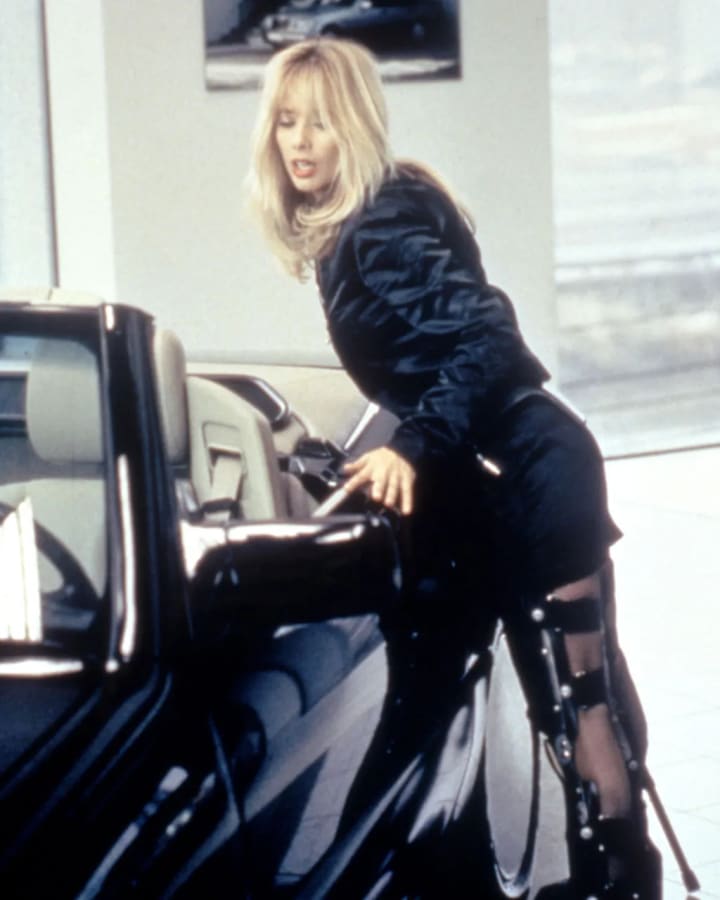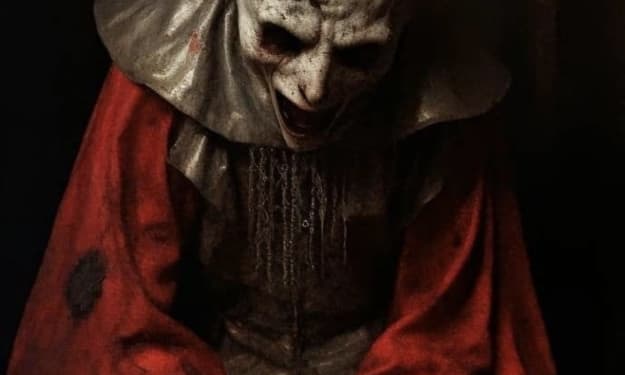Why twisted erotic thriller Crash still stuns, 25 years on
David Cronenberg caused hysteria with his take on J G Ballard's novel about car crash fetishists. While it is less controversial now, it startles nevertheless, writes Arjun Sajip.

On Monday 3 June 1996, any Londoner who picked up a copy of the Evening Standard newspaper on their way home from the office would have paused when they reached the headline: "A movie beyond the bounds of depravity".
These words accompanied a fiery full-page diatribe penned by the Standard's film critic, Alexander Walker, deploring David Cronenberg's latest film Crash – an adaptation of the JG Ballard novel about a group of people who derive sexual pleasure from car crashes – in the strongest possible terms. An august commentator who had held his post at the Standard for 36 years, Walker was no prude: he had been an outspoken critic of censorship and a staunch defender of Stanley Kubrick's controversial 1971 film A Clockwork Orange, among other things.
So how could such a seasoned and liberal critic find a film so objectionable – so unopen to interpretation – that he argued it shouldn't be seen? Was this simply a case of a critic turning reactionary with age? Or was there something profoundly disturbing – and potentially harmful – about David Cronenberg's Crash?
Twenty-five years on from Crash's original release, it is undoubtedly still a startling work that contains deeply challenging, even confrontational themes, and presents them in an intense, controlled, uncompromising way. For a start, the film's first scene is a sex scene. So is its second scene. And its third. When viewed for the first time, especially in a cinema, it feels discomfiting: partly because you're never quite sure when the onslaught of copulation will end, and partly because the third scene reveals that two of the lovers shown with different partners in the previous ones are in fact a husband and wife, James and Catherine (James Spader and Deborah Kara Unger). Their sexual satisfaction comes from recounting that day's infidelity while having sex on a balcony overlooking a highway.
That highway is Highway 401, the Toronto section of which is, in real life, the busiest highway in North America, and so infamous for crashes that one section has been dubbed Carnage Alley. You wouldn't know this from watching Crash: the flow of cars below James and Catherine's apartment, filmed in evening hues with an uncanny sumptuousness by cinematographer Peter Suschitzky, is regular, predictable, entirely conventional.
The 20th Century reaches its highest expression on the highway. Everything is there: the speed and violence of our age; its strange love affair with the machine; with its own death – JG Ballard
But a violent crash is what kicks off the film's plot. James loses control of his car during a night-time drive and swerves down a verge into oncoming traffic, driving into the blinding lights until his car crashes head-on into another. That car's passenger is flung headfirst through James's windshield, dying instantly. Stunned, James looks at the driver of the other car. It is a sharp-faced, brunette-bobbed stranger, Helen (Holly Hunter), whose natural reaction, upon seeing the author of her husband's death, is to remove her seatbelt and flash her breast to him.
Clearly it isn't just James and Catherine who are sexually deviant; it is a feature of the film’s world. Helen, whose attraction to James after their accident is very much mutual, inducts him into a group of car-crash fetishists led by Vaughan – by far the most sensuous and alive character in the film, and the figure around whose mysterious project the group coalesces. The final key figure to be introduced is Gabrielle (Rosanna Arquette), a mischievous young disabled woman with callipers clamped tightly around both her legs, who has been part of the group for some time, and who has a deep vulva-shaped scar on her thigh.
Throughout the many sex scenes that follow, almost every possible permutation of couplings is realised. James and Helen. James and Gabrielle. Vaughan and Catherine. Vaughan and James. Helen and Gabrielle. The scenes are never explicit in a hardcore sense, but neither are they shy. The cars themselves come to play an increasingly significant role in the sexual logistics – stationary at first, then moving slowly through a car wash, and then, as Vaughan’s project approaches its endpoint, at high speed on the streets.
What is Vaughan's project? Nothing more, and nothing less, than the ultimate merging of sex and car crashes – or the merging of sex and car crashes with the ultimate. If the French term for "orgasm" translates to "little death", Vaughan's dreams of sexual satisfaction are bigger: a grand death, with squealing tyres, crashing fenders, spinning wheels and shattered glass.
The root of its disturbing power
Late in the film, Vaughan delivers the line that, more than any other, sealed Crash's fate as a potentially offensive work: "the car crash is a fertilising rather than a destructive event – a liberation of sexual energy that mediates the sexuality of those who have died with an intensity impossible in any other form."
Automobile accidents were nothing new in cinema, and indeed a wide range of films – from Bonnie and Clyde to Weekend to Badlands – had drawn links between cars, liberation, sex and death. These films can be described as "existential romances", which is also how Cronenberg described Crash. But while those three films and so many others have romanticised their protagonists, setting them against fusty authority figures or – in the case of Badlands – allowing the characters to romanticise themselves to each other, Crash is disturbing because it redraws the boundaries of what we might consider romantic. It takes conventional Hollywood erotic potential – the ethereally sensual performance of Unger and the boyishly handsome, leather-jacketed Spader – and puts it through the wringer, making us watch until our usual responses to sex in cinema have been exhaustively deconstructed. It doesn't just posit the deeply unsettling idea that car crashes can be "fertilising rather than destructive"; it explores this argument in good faith. That's what makes the film so disturbing.
Most surprising of all, this was not an abstract intellectual exercise for either Ballard or Cronenberg: it was deeply personal. The protagonist's full name in both novel and film is, in fact, James Ballard, and Ballard the writer once described Crash as more autobiographical than his actual memoir, Empire of the Sun. "These were my fantasies," said Ballard at a live interview event hosted by the Guardian around the release of the film, when asked why he named the character after himself; it gave the novel "a degree of honesty that would be absent otherwise".
Meanwhile, when pondering what brought on the urge to make a film of the novel, Cronenberg, a certified motorhead, said that the novel "had started a process in me that I could only complete by making a film of it, because that is my only means of exploring my reactions to things, and my understanding of my own life".
I really did find the response to my film in the UK to be a kind of strange island response. There's a siege mentality in England, I think, and a fear of being contaminated – David Cronenberg
But the story of Crash's origins stretches back farther than the novel. In 1970, three years before the novel was even published, Ballard unveiled a controversial three-week exhibition titled Crashed Cars at the New Arts Lab in London, which featured the three titular structures simply on display. The following year, he starred in a short experimental film titled Crash! for the BBC's Review series. Although it was inspired by a chapter from his previous novel, The Atrocity Exhibition, it already contains the seeds of Crash – not just Ballard's transfiguration of himself into his art, but a deeply thought-through meditation on the metaphysics of car crashes and the role of the car in the modern world.
"The 20th Century reaches its highest expression on the highway," says Ballard in the film. "Everything is there: the speed and violence of our age, its strange love affair with the machine, with its own death." He goes on to ask in what many might judge an extreme provocation, "Are we just victims in a totally meaningless tragedy, or does it in fact take place with our unconscious and even conscious connivance? Each year, hundreds of thousands are killed in car crashes all over the world. Are these arranged deaths? Arranged by the colliding forces of our technological landscape, by our own unconscious fantasies about power and aggression?"
There was almost no way Hollywood could take this idea – not only that any of us could be a killer, but that we use consumer technology to simultaneously hide and realise our dangerous potential – to its logical conclusion without softening the blow of its implications. Any film that explored this concept fearlessly would have to come from outside the usual studio system, not least when sex was added to the mix, as in Ballard's vision. Indeed, the first film adaptation of Crash in 1986 was an unauthorised short, Nightmare Angel, directed and produced on a shoestring budget by two young women, Susan Emerling and Zoe Beloff.

But a larger budget – even if still set relatively low for a feature film, at $9 million – was required to get across the visionary, hard-hitting nature of the material. All the car scenes in Crash, particularly when the cars are in motion, have retained their impact largely because of their use of actual cars shot on location. Having real cars aggressively tailgating each other on real highways adds a layer of realism to the film that would not have been possible with computer-generated imagery or a micro budget; it brings it that much closer to our world.
The moral panic it caused
Despite, or more likely because of, its technical mastery and professionalism, Crash bruised audiences. The film's troubles began in May 1996, when it premiered at the Cannes Film Festival to a wildly divided reception. It is not rare for a film to be both cheered and jeered, but it is somewhat rarer for a Cannes jury to create a "Special Jury Prize for originality, for daring and for audacity", to circumvent the vehement dislike of a film harboured by the jury president – in this case Francis Ford Coppola, who refused to hand the award to Cronenberg personally.
Two weeks later, across the Channel, Walker's June screed was the prelude to a media furore that really kicked off in November following its first UK public screening at the London Film Festival. The Daily Mail and the Evening Standard launched a campaign to get the film banned, and succeeded in councils as far flung as Cardiff, Kirklees, Walsall, North Lanarkshire and London's Westminster – so the film could not even be seen in the West End.
When, in March 1997, the British Board of Film Classification (BBFC) passed the film uncut despite intense pressure, the Mail's response, on its front page, was: "Censor's Yes to Depraved Sex Film". Not only did the paper doorstep the BBFC's examiners and publish articles about their private lives – reducing BBFC examiner Margaret Ford to tears on the doorstep of her home – it called on its readers to boycott the entire output of Sony, Crash's UK distributor.
It wasn’t just tabloid journalists that were fulminating over the movie. Crash had become a political hot potato in Whitehall: it was discussed in serious tones in the Home Office, and Heritage Secretary Virginia Bottomley also encouraged local authorities to ban the film, even though she hadn't seen it. Speaking at the London Film Festival, Ballard said he believed such pronouncements arose from a "panic" that the then-Conservative government felt "in the face of almost certain electoral defeat… they're climbing aboard every conceivable bandwagon".
The sex scenes are the movie. If viewers resist watching them for narrative, for character development, for the texture… they don’t get the movie – David Cronenberg
In any case, the film made a profit worldwide; the heatedness of the UK's response to Crash appears to have been exceptional. "I really did find the response to my film [in the UK] to be a kind of strange island response," said Cronenberg on the BBC debate series Heart of the Matter. "There's a siege mentality in England, I think, and a fear of being contaminated… I've had reactions from about 40 countries, and nothing approaching the craziness I found in England."
In many ways, Crash is an uncontroversial work now: since its 4K restoration was unveiled last year, it has been widely hailed as a masterpiece. Yet its intentions remain elusive. At the Guardian live event, Ballard and Cronenberg themselves disagreed about whether it was ultimately a cautionary tale. According to Ballard, it had "to be a cautionary tale, otherwise it’s a psychopathic statement,"– a reading Cronenberg said that he found limiting. Ballard himself would later retract his description, calling the novel "a psychopathic hymn".
One of the more troubling aspects of the film is the fact that it dwells hardly at all on the chief consequence of engineering car crashes for sexual pleasure, namely that innocent people get killed. Indeed, Daily Mail journalist Christopher Tookey correctly countered Cronenberg’s observation that all the sex acts in the film are consensual: as he pointed out, the sex acts themselves might be, but the crashes – an intrinsic part of the frisson – most definitely are not.
How it stands up today
Cronenberg's absolute commitment to showing, not telling, and his refusal to adorn the film with any visible moral framework, a responsibility he entrusted to the audience, made the film feel radically uncompromising. Crash was unquestionably sui generis: BBFC head James Ferman said it was "a one-off", and that "there'd never been anything [like it]… we couldn't compare it to anything". But by that same token, Crash also felt like a culmination, too final and absolute in its ideas (and the execution of its ideas) to act as a departure point for any other filmmakers to follow. It created a genre that only it occupied – until this year, that is, when Julia Ducournau's Titane appeared. Faring better than Crash at the Cannes Film Festival by actually winning the Palme d'Or, Titane also links sex, cars and violence, while updating certain of Crash's themes for the 21st Century and making technology seem even more giddily invasive: for one thing, Titane's protagonist has sex with, not just in, a car.
Nonetheless, Crash remains sexually transgressive. Though it broke no boundaries for sexual explicitness, it unmoored sex in cinematic terms from its biological underpinnings, from its conventional association with romance, and from being any kind of plot point or crowd-pleaser. Alexander Walker may have complained that the characters are "defined solely in terms of their sexual obsessions", but for Cronenberg, this was part of the point. "The sex scenes are the movie," he said in one interview. "If [viewers] resist watching them for narrative, for character development, for the texture… they don't get the movie."
Many audiences were also not prepared for the sexualised depiction of its disabled character, Gabrielle. On the one hand, there was a view that this portrayal was offensive, amounting to what Tookey called "orthopaedic fetishism". But on the other, the BBFC, being mindful of this, screened the film to a group of 11 disabled people and found that while "the invited group did not generally enjoy the film, they concluded that its depiction of disabled people as being able to be both sexually attractive and active [was] generally a positive thing." What's more, Cronenberg told the BBCs Heart of the Matter that "I've had several people write me and call me saying that for the disabled, [Gabrielle] is an icon, a heroine, because she is someone who refuses to become a withered, sexless creature [after her] accident; in fact, she is very proud and strong in her own sexuality and eroticism, and is trying to incorporate her own body into her sexuality, rather than trying to cover up or pretend [her disability] is not there."
Indeed, one of the most intriguing readings of Crash is that it is perversely hopeful. Viewed now, at a time when the pervasive sexlessness of mainstream cinema is regularly bemoaned by cineastes, Crash seems especially bracing: its characters will do anything for sexual connection with a consenting partner. To many viewers, this is overwhelmingly dark. But Cronenberg for one sees things differently. "Personally, I don’t think the movie is depressing at all," said the Canadian provocateur in an interview with American Cinematographer. "The characters don't just cave into the empty, lifeless situation that they find themselves in. They seek life, even if they're seeking it through death or danger. And I think that's very human."
About the Creator
Copperchaleu
The most charming woman I've ever met.






Comments
There are no comments for this story
Be the first to respond and start the conversation.